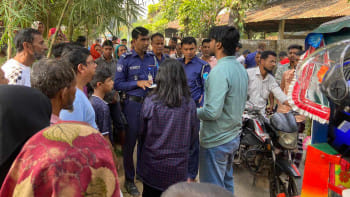Nearly 90% income tax comes from Dhaka, Chattogram

Dhaka and Chattogram account for 90 per cent of the income tax collected from across Bangladesh each year and so, the National Board of Revenue (NBR) should work on widening the tax net, according to speakers at a seminar.
"The NBR still heavily depends on these two regions as 74 per cent of the tax collected comes from Dhaka while 16 per cent comes from Chattogram," said Snehasish Barua, a partner of Snehasish Mahmud and Co Chartered Accountants.
He made these comments at a seminar on "100 years of Income Tax Law of Bangladesh-Expectation and Achievement", at Gulshan Club in Dhaka yesterday. The event was organised by the International Business Forum of Bangladesh (IBFB).
He went on to say that regions outside Dhaka and Chattogram have undergone a "silent development" over the years, but the authorities have so far been unable to bring them under the tax net.
This is mainly due to the lack of taxmen in various areas and so, tax offices should be spread at the union level to increase collection, Barua said.
He also underscored the need for increasing collection of direct taxes to help address the challenges Bangladesh will face after graduating from a least developed country in 2026.
"If direct tax collection does not increase now, then Bangladesh will face difficulties to increase internal revenue generation after graduation," Barua added.
Regarding the volume of tax returns being filed, Barua said the number of e-tins hit 74 lakh in fiscal 2020-21, up 31 per cent from 43 lakh in fiscal 2018-19.
However, the average income tax collected from each e-tin holder fell 11.4 per cent to Tk 1.12 lakh from Tk 1.43 lakh at the same time.
"So, the average number of tax returns have been increased, but the total collection has decreased," he added.
Barua then said the rise in returns filed is due to the growth of small taxpayers while the drop in overall collection is because of a corresponding decline in large taxpayers.
"This is not a healthy sign for the country," he added.
Regarding the methods of tax collection, he said around 94 per cent of the direct taxes are collected from various deductions, such as advance income tax, withholding tax and tax deposited during submission of return.
Meanwhile, the NBR collects the remaining 6 per cent through other procedures, such as tax paid by salaried individuals.
Asked about the potential automation of the tax collection process, Barua said a lot of initiatives have been taken by the government, but those are not enough.
"There is a lack of synchronisation between the country's tax and customs offices," he added.
Barua then said tax exemption in Bangladesh should be rationalised in order to increase the tax-GDP ratio.
Speaking as chief guest, Planning Minister MA Mannan said regular discussions for reforming outdated tax laws should not be stopped at any cost.
The minister then said the tax exemptions should be abolished immediately for the country's greater interest.
"Why tax exemption is on the rise in Bangladesh is totally unknown to me," Mannan added.
MS Siddiqui, a legal economist and adviser to the Bangladesh Competition Commission, said Bangladesh still uses unjust practices in its tax affairs.
"Tax collection has not improved. Increasing the tax-GDP ratio is impossible in absence of dynamism in the tax law," Siddiqui added.
Muhammad Abdul Majid, a former chairman of the NBR, said the problem lies in both sides -- the taxpayer and receiver.
"So, it is very important to change our attitudes on both sides for the state's wellbeing," he added.
The seminar was chaired by IBFB President Humayun Rashid.
Among others, AF Hassan Ariff, former attorney general and former adviser of the caretaker government, Hafizur Rahman Khan, immediate past president of IBFB, and Lutfunnisa Saudia Khan, vice president (finance), spoke at the event.


 For all latest news, follow The Daily Star's Google News channel.
For all latest news, follow The Daily Star's Google News channel. 



Comments